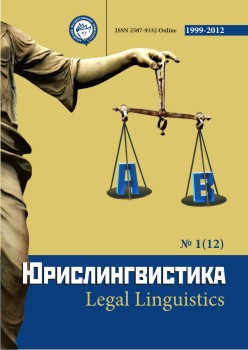LEGAL PERFORMATIVE UTTERANCES IN THE TEXT LINGUISTICS
Abstract
The article deals with the following problems: performatives among other speech acts, legal text as genre, categorial characteristics of utterances, textual and extratextual indications of performativity, predicative modal expressions in normative utterances, indications of modality and directivity, correlation of performativity, modality and directivity
Downloads
Metrics
References
Почепцов, Г. Г. Прагматический аспект изучения предложения / Г. Г. Почепцов
// Иностранные языки в школе. – 1975. – № 6. – С. 15–25.
Романов, А. А. Системный анализ регулятивных средств диалогического
общения / А. А. Романов. – М.: Институт языкознания АН СССР, Калининский
СХИ, 1988. – 183 с.
Austin, J. L. How to do things with words / J. L. Austin. – Oxford, 1962. – 162 p.
Fraser, B. Hedged performatives / B. Fraser // Syntax and Semantics. – Vol. 3:
Speech Acts / ed. by P. Cole, J. L. . – New York etc.: Academic Press, 1975. –
P. 187–210.
Habermas, J. Vorbereitende Bemerkungen zu einer Theorie der kommunikativen
Kompetenz / J. Habermas // Habermas J., Lukmann N. Theorie der Gesellschaft oder
Sozialtechnologie. – Frankfurt/M.: Suhrkamp, 1971. – S. 101–141.
Wunderlich, D. Studien zur Sprechakttheorie / D. Wunderlich. – Frankfurt/M.:
Suhrkamp, 1976. – 416 s.
Copyright (c) 2017 Юрислингвистика

This work is licensed under a Creative Commons Attribution 4.0 International License.
The authors, which are published in this journal, agree to the following conditions:
1. Authors retain the copyright to the work and transfer to the journal the right of the first publication along with the work, at the same time licensing it under the terms of the Creative Commons Attribution License, which allows others to distribute this work with the obligatory indication of the authorship of this work and a link to the original publication in this journal .
2. The authors retain the right to enter into separate, additional contractual agreements for the non-exclusive distribution of the version of the work published by this journal (for example, to place it in the university depository or to publish it in a book), with reference to the original publication in this journal.
3. Authors are allowed to post their work on the Internet (for example, in a university repository or on their personal website) before and during the review process of this journal, as this may lead to a productive discussion, as well as more links to this published work (See The Effect of Open Access).











